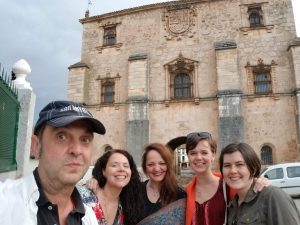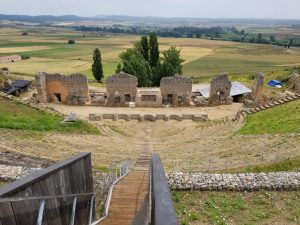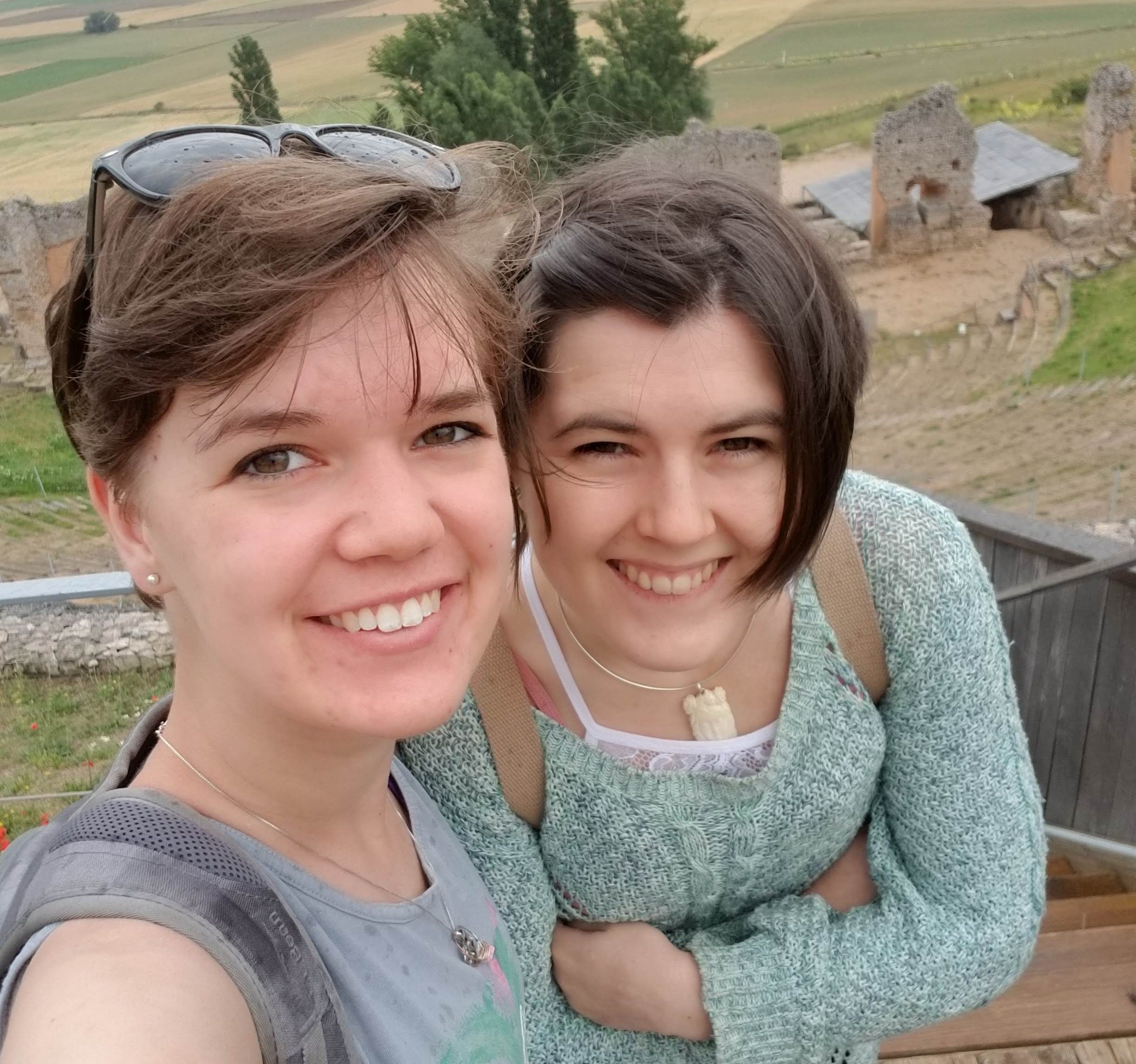So who are you and what did you do?
Adrian: My name is Adrian Burr and I’m a Spanish and English double major, and Sarah and I did a Theory-to-Practice Grant entitled “Female Empowerment in Classical Spanish Theater” with Professor Glenda Nieto-Cuebas.
Sarah: My name is Sarah Gielink, and I’m a Theater and Spanish double major with an English minor. We visited three cities while we in Spain, Madrid, Burgos, and Almagro. In Almagro, we went to the International Festival of Classical Spanish Theater.
Adrian: We also took two workshops. One was with a company called Morfeo Teatro, which was a more of an information session and talk-back. The other was with a company called Teatro Inverso, which means “reverse theater” in Spanish. That was where we had a more traditional workshop.
What aspects of female empowerment did you focus on?
Adrian: We were exploring the way these two women had adapted one of the canonical plays from the Early Modern period, called La vida es sueño (Life is a Dream). They changed the story so that it focused on one of the main female characters, and they also made it much more movement-oriented and used more story-telling, instead of the more traditional creation of scene. They chose to incorporate more contemporary elements as well, which enabled them to highlight the potential feminist interpretations of the play. We were with them for about four hours doing all of the exercises that they did when they were prepping the movement pieces that went into that play.
Sarah: We had memorized a couple of monologues from the play beforehand, so we used those during the workshop. Because the women leading the workshop both spoke Spanish and English, the entire thing was bilingual as well, so we would switch back and forth in the middle of a monologue. One of the main ideas was to bring our own background into the story.

Adrian, Sarah, and Professor Nieto-Cuebas with actors from Morfeo Teatro
What gave you the idea for this Theory-to-Practice Grant?
Sarah: Well, I got a message from Adrian on a Sunday night asking me if I wanted to do a grant with her and our professor, and casually adding that the proposal was due that Thursday.
Adrian: I had been abroad and wanted to go back to Spain, and Professor Nieto Cuebas had been to this festival before with other students, so she suggested we try to go. We were both taking a class with her that semester, and we chose the theme because everything we were reading in the class seem to have such interesting gender dynamics. One of the recurring themes was how essential honor wasthe masculine identity almost revolved around the females beneath them keeping their honor, and that was really the thing that stood out the most to us when we were reading, so we thought it would make a great focus for the trip. We built from there how we would explore that theme.
Did your focus evolve at all over the course of the project?
Sarah: Our theme did sort of grow while we were over there. We followed the proposal pretty closely for the most part, but the workshop with Teatro Inverso actually wasn’t planned originally. It was something we added on after the fact that actually ended being the most beneficial part of the entire trip.
Adrian: We also ended up focusing more on how real people are adapting these works today, and what their interpretations are, and how those interpretations can inform the ways we think about these works as well.
What was it like writing a grant proposal in five days?
Adrian: That’s the best way I write grants. The desperation comes through and makes it really compelling. You can’t edit too much, you can only do the bare minimum, because that’s all you have time for. It’s also worth mentioning that this was the first grant deadline, so…
Sarah: For me, the sudden realization that I could go to Spain was a huge motivator. I’d never been in an immersion environment for my Spanish, and that fueled me quite a lot. The time crunch almost allows to just dream and go for it. You don’t have to time to overthink, so we just got it done and then it got accepted, and we were like “Whoa, it worked? We actually get to do this?”
What would you say was your favorite memory from the whole trip?
Adrian: Of course, the workshop was amazing. But one of the companies, Morfeo Teatro, gave us this sort of whirlwind tour. They drove us to a Renaissance town, to a medieval town, and then they drove us to a site that had been a really important town in the Roman Empire, where there was a theater. They explained the history of it to us; when Rome was expanding, they needed the people who had just come into their empire to like them, so the theater was their way of giving them bread and entertainment, as the saying goes.

Ruins of a Roman theater
Sarah: For me, it was a lot of different little things. The first time I spoke to a stranger in Spanish, I ordered a cafe con leche at the airport. It was the first time I’d used my Spanish in “real life,” and all I did was order a latte, but it was really exciting.
Adrian: We had this really great moment when we were walking around this neighbourhood in Madrid, and it was Pride Month, so everything was covered in rainbows. I bought a rainbow fan for like five euros. Another favorite is when we got to see Billy Elliot, the musical, in Spanish. It was so interesting, because like the Early Modern plays we’d seen, it was still theater that was being adapted, but instead of the content being adapted through time it was across languages and across cultures, and so it had a similar theme.
Sarah: We also found the last jar of peanut butter in the grocery store.
Adrian: Yeah! We looked through the whole store before we finally found the last one, because it’s super American, it’s only for the Americans. And they were charging ten euros or something crazy for it, it’s like American gold.
Of course. There’s the gold standard, the silver standard, and the peanut butter standard.
Adrian: Exactly.
What would you say is the most valuable thing you learned from the experience?
Adrian: The thing that impacted me most was the sensation I felt when we were doing the workshop. Because of how physical and movement-oriented all of the exercises were, we were able to get out of our heads, which is something I really value. A lot of the things we do in school are so intellectual and analytical and in your head. The movement, and then also the music they added, combined with the fact that I was just so exhausted, really allowed me to finally let go of thinking about it. Then, all of these really cool moments came out of that. We were spontaneous, we were responding to each other, and it created this really genuine human interaction. For me, it just reminded why we have theater.
Sarah: Going off of that, when we took our first break, I don’t know how long we’d been going, but we had been doing all of this movement, and we were just dripping sweat. We sat down, and we were talking about it with the women leading the workshop, and they told us we looked different. It was really cool because we felt so much more open, and that was showing on our faces and the way we held ourselves.
Any last thoughts?
Adrian: One really valuable takeaway, and I know Professor Nieto Cuebas is trying to incorporate this more into her teaching, is really that the best way to study and learn about plays is just to do them. I gained so much knowledge of how true that is from everything we did. I think that’s the element that’s missing a lot of the time when we study theater.

